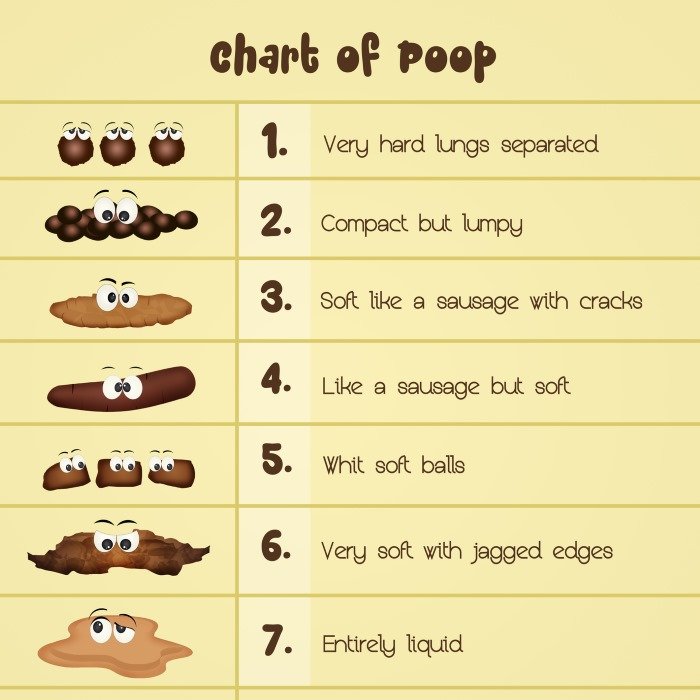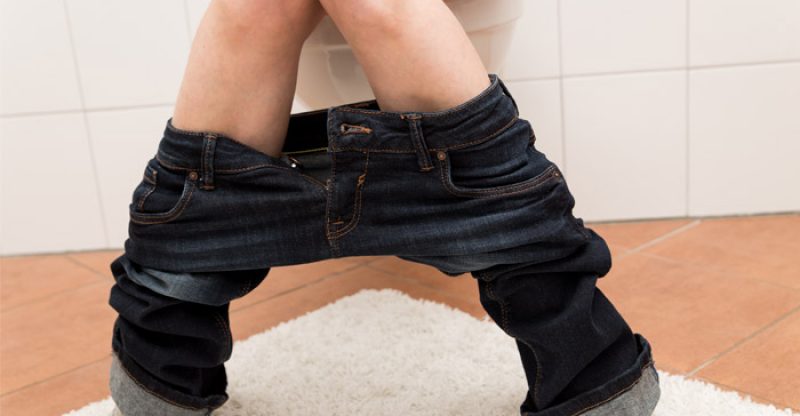Types of Poop: What’s Healthy and What’s Not
Why Poop Matters?
Your bowels hold more information about you than you can imagine.
Therefore, closely monitoring your poop can even save your life, if any problems arise.
Imbalances within your bowels can result in mild symptoms, such as lethargy, a sour taste in your mouth, nausea, and constipation.
And in severe cases, it can lead to life-threatening complications, such as bowel perforation, hemorrhaging, and severe electrolyte imbalances.
Pooping is a universal dilemma faced by every mammal on this planet, so it should not be met with shame or fear.
Taking responsibility for your own bowel habits is one of the simplest ways to jumpstart your road to health.
The sole purposes of pooping are to rid our bodies of waste and allow room for more nourishment.
Pooping is a natural, necessary part of our bodily functions, which is an instinct-driven, primal experience.
Benefits of regularly pooping include healthy bowels, improved mental clarity, and a general feeling of well-being.
Cleansing occurs in the body when waste is excreted.
From a more holistic perspective, we can say that taking a seat on the porcelain throne will set a calming environment, and relax your mind and your body enough to defecate in peace.
Taking time away from the kids or work for just a few minutes a day can relieve you of more stress than you knew you had.
I believe that including your pooping time as your “personal” time can be a motivator to strive for a pattern of daily bowel elimination.
Remember, poop time is your time!
What Is a Normal Poop?
Normal bowel habits can be influenced by numerous factors, but it is important to remember that “normal’ poop is subjective.
The easiest way to identify if your stool is to first ask yourself: “How are my poops usually shaped and colored?”
Establishing a baseline of your bowel habits is an important part of developing a health plan for your bowels, in order to maintain adequate bowel functions.
Secondly, glancing at a stool chart can help you determine the texture and consistency of your poop, based on its characteristics.
A good poop chart will show you a range: from loose, watery stools to rabbit-like pellet stools.

On this poop chart, seven diverse types of stools exist:
- Pellet-like stools that are hard to pass (severe constipation).
- Sausage-shaped stools with lumps on the surface (severe constipation).
- Sausage-shaped stools with cracks in the surface (mild to average constipation).
- Soft, smooth, and snake-shaped stools (The perfect poop, on average).
- Blobs with edges (average poop).
- Mushy, applesauce-like stools (Average poop to borderline diarrhea).
- Watery stools (Diarrhea).
I believe that in order to keep things solid — no pun intended — a soft, smooth stool with no cracks is the perfect middle ground.
While there is no perfect poo, a healthy bowel movement should not result in straining.
However, it should range from deep brown to light brown or even green in color.
A bowel movement that is circular with cracks could indicate that you are not drinking enough fluids.
A snake-shaped bowel movement with smooth edges is the “ideal” poop for comfort and bowel health.
But loose stools are normal if they only occur occasionally.
Why Do I Poop so Much?
Eating substantial portions of food can result in copious amounts of stool, and the sensation to defecate more often.
An increase in gastrointestinal motility can occur when food is processed in the intestines too quickly.
As a result, peristalsis is increased, depending on how often the muscles in your bowels squish digestive matter through your intestines.
Therefore, you poop so much because food travels through your digestive system, or your intestines are overzealous about getting your poop out!
How Many Times a Day Should I Poop?
The healthy minimum is once every three days.
However, once every day is ideal, depending on your diet, fluid intake, and daily exercise.
If you have no medical history indicating otherwise, a fluid intake of 2 liters per day is necessary for adequate bowel health.
You should also ingest 25 – 30 grams of fiber, and you should get 30 minutes of exercise outside of your daily routine.
Why is My Poop Green?
Over the years, I have found that green poop can be due to many factors, such as your intestines processing the food you are eating too quickly.
Your digestive system contains bile, which is produced in your liver as it makes its way to your gallbladder.
Whenever food is processed in your digestive system, bile helps break down food particles.
In the event that your body processes food too quickly, the bile present in your digestive system does not have time to fully dissipate.
As result, your poop will turn green.
Leafy greens and green-colored food dyes also play a role in turning your poop green.
Green poop is not necessarily dangerous.
However, an underlying issue might be present if you consistently have green feces.
What is Abnormal Poop?
I think we all have had a time where we looked down at the toilet and wondered what just came out of us.
However, the good news is that most of the time, it’s just our bodies doing things a little differently.
Abnormal poop will occasionally happen to all of us, but it’s important to notate:
- If you are experiencing severe pain.
- If you have a gut feeling that something isn’t right.
Always listen to your body, because it knows best.
If your abnormal poops have not changed after three days of monitoring them, follow up with your primary healthcare provider.
Abnormal bowel movements can be defined as anything that differs from your normal poop schedule and raises alarm.
Do you ask yourself: “How many times a day should I poop?”
If so, you should consider changing your diet or taking other measures that will alter your bowel habits.
To directly answer your question, an “abnormal poop” depends on the texture.
Having multiple soft stools in one day is not an abnormal bowel movement, but if your stools are liquid, you should take the time to consider why.
If you are experiencing multiple watery stools in one day, then that could be considered too many.
If you are uncomfortable with the number of bowel movements you have in one day, consider increasing your fiber to reduce the number of liquid stools you experience.
Poop that is hard and cracked is abnormal because it is the result of constipation.
If poop comes out in pellets with liquid following it, it is also considered abnormal.
Constipation can lead to blockages in the intestines, which is abnormal.
It can be painful or bring on great discomfort.
If you are concerned about whether or not your poop is abnormal, assess your poop over three days.
Then see if there are any changes, or if you are still experiencing symptoms.
If you are having red or black stools, you should not wait three days to assess your own poop.
Abnormal stools include:
- Bloody stools (red or black stools)
- Sticky, tar-like stools
- Stools that are difficult to pass
- Watery stools that last for over 3 days
- Oily or white plaques in your stool
Other colors of the poop rainbow that you should watch out for are:
- Bright Yellow (possibly a malabsorption of fats)
- Black (indicative of intestinal bleeding or upper-gastrointestinal bleeding, which could be life-threatening)
- Red (indicative of lower intestinal bleeding or rectal bleeding, which could be life-threatening)
- White (an obstruction of bile present in your system)
The colors you should not be concerned about are:
- Light brown
- Dark brown
- Green (if it doesn’t happen often)
Causes of Abnormal Poop
Abnormal poop can be caused by several conditions, such as diet, stress, biological factors (such as other medical conditions), medications, and exercise.
Narrowing down what is currently causing the change in your bowel movements is the most specific way to find a solution to your poop problems.
Low-fiber diets with low fluid intake can result in constipation.
Without having enough fiber in your diet, your poop does not have enough bulk for your intestines to quickly process it.
As a result, your poop begins to solidify in your intestines and results in constipation.
Extreme stress can result in a fight-or-flight response, which triggers your nervous system, and it can make you feel an urgent need to defecate.
Your body aims its conservation efforts towards your brain and heart and gives you a surge of energy to overcome the stressor.
The fight-or-flight response can eventually cause major changes in your pooping patterns.
Medical conditions can alter the way you metabolize foods, how quickly you process foods, or even how the muscles in your digestive system react to foods.
With all of these changes in mind, assessing how your medical condition affects your pooping pattern should take priority.
Along with any medical conditions you may have, the medications you take for said conditions may slow your digestive system and alter your metabolism.
Therefore, research your medications on your own time, and look for constipation as a side effect.
Exercise helps all the juices slosh around in your digestive system. And aptly, sedentary lifestyles can result in constipation.
If you believe you are experiencing blood in your stool, you should immediately see a medical professional.
Sticky, tar-like stools can be indicative of a metabolic issue, or that your digestive system is bleeding.
Red stools indicate rectal bleeding or that bleeding is originating in the lower intestines.
Black stools that look like coffee grounds indicate that you may be bleeding somewhere in your upper gastrointestinal system.
If you are currently taking iron supplements, you should not be concerned, as black stools are then entirely normal.
Hard stools can be normal, although not immediately life-threatening.
However, they may fall into the abnormal category, due to the risks that prolonged constipation brings.
Constipation should not go unrelieved for over three days.
Difficult-to-pass stools pose a threat by placing you at risk for hemorrhoids.
It is normal to have a bowel movement that is difficult to pass on occasion but try to avoid straining while having a bowel movement.
This practice will reduce your chances of experiencing negative symptoms.
Everyone occasionally experiences constipation, but it is very important to ensure that adequate measures are taken, in order to prevent constipation from progressing to be the intestinal blockage.
On the opposite end of the spectrum, if you have watery stools for 3 days, it can place you at risk for electrolyte imbalances.
And it may be indicative of an infection — if you have taken antibiotics recently, or have a lowered immune system.
On rare occasions, an infection by the name of Clostridium difficile (or “C-Diff”) alters your intestinal and gastric flora — by letting the bacteria that usually lies dormant in your digestive system wreak havoc on your intestines.
This impact can result in infectious, watery diarrhea that can be fatal.
If you are not experiencing fever, lethargy, or tinging in your muscles and extremities, then you should not be concerned about diarrhea you are experiencing.
Diarrhea can also be caused by food moving through your digestive system too quickly, as well as your intestines squeezing too frequently and quickly.
Evaluate your own situation, and ask yourself what prompted your diarrhea.
Here’s my best advice for those you are experiencing diarrhea: keep close to the toilet and use soft, moist wipes.
If you ever have had a bowel movement that looks like you spilled a bottle of olive oil in the toilet, it may be a good idea to consider your current diet before panicking.
Diets heavy in fats and oils can result in steatorrhea (fatty stools).
In more severe cases, oily stools may be indicative of an absorption issue that will need further evaluation — if the issue persists beyond a few days.
The metabolic condition called cystic fibrosis can be a real possibility.
Diets high in fat can cause fatty stools and changes in your body’s ability to absorb fat — which are usually due to a deficit of bile or digestive enzymes.
If you are concerned about having fatty stools, consult with your doctor, especially if you are experiencing unexpected weight loss.
How to Get Your Poop Back to Normal
If you’re curious about regulating your bowel health, a simple way to remember is the acronym FEW: fiber, exercise, and water.
Increasing the amount of fiber you have in your diet increases the bulk of your stools, and makes your poops smooth and silky.
Fiber may seem like the wonder cure to make your seat on the porcelain throne a pleasant one.
However, not drinking enough water can turn your miracle cure into a nightmare.
Excess consumption of fiber — without drinking enough fluids — can result in hectic constipation, which you would never want your worst enemy to experience.
Fiber works in the digestive system by providing bulk to your stool, which allows your stool to pass through your intestines more quickly.
Whenever your stool quickly passes through your intestines, there is not enough time for it to solidify into a hard mass, which results in constipation.
Mind you, fiber only works as it is supposed to when there is enough fluid in the mix.
Imagine that you’re baking a cake.
You use two boxes of cake mix, instead of one.
But you keep the same amount of wet ingredients that you would use for one cake.
Your cake will be dry, and there will be parts that are not even moist.
Whenever you do not add liquid to fiber, it solidifies in your digestive system and can result in constipation.
Here are a few insoluble superfoods that supply fiber to fix constipation:
- Brown rice
- Green beans
- Broccoli
- Prunes
- Navy beans
- Wheat breads
Here are a few soluble superfoods that can fix diarrhea:
For any other food not on this list, it is important to remember that the fiber you are looking for in foods is insoluble.
Insoluble fiber adds bulk to the stool and does not break down into a gelatinous substance.
It relieves constipation by bulking up the stools enough for the intestines to easily push them out.
For diarrhea, it is important to remember to look for soluble fiber.
These foods relieve diarrhea by adding substance to your stools, then convert them to a gelatinous substance that bulks up your stools in a different way.
A BRAT (bananas, rice, applesauce, and toast) diet quickly can relieve diarrhea.
BRAT diets work by resetting your system.
So basic, bland foods allow your intestines to rest, while still encouraging intestinal function.
Bland foods can offer the following benefits:
- They do not irritate your intestinal mucosa.
- They are soft enough to reduce strain on your stomach and intestines.
- They are properly digested and process the food.
If you are not experiencing an infection or a flair-up from a previous medical condition, you can help reset your bowels by allowing your system to rest for a few days.
Difference between a Laxative and a Stool Softener
A laxative is a brute-force way to get the stool out of your intestines — by squeezing your intestines or drawing massive amounts of fluid into your stool.
This impact can result in cramping, discomfort, and watery diarrhea.
A stool softener adds liquid into your stool and helps it move along without the crampy feeling or severe side effects.
Stool softeners can be used daily, but a laxative should not be used every day.
Non-pharmacological means to relieve constipation include drinking prune juice or coffee, or simply drinking more water.
Prune juice works in the digestive system by acting as a stool softener, which adds fluid and bulk to your stools.
Prune juice is not just meant for older readers.
I’ve personally used it for bowel health since I was twenty.
Coffee works in the digestive system by acting as a laxative and increasing peristalsis, which is the movement that squishes your intestines together.
So it quickly forces the poop out of your body.
We have all experienced miraculously rapid coffee poops — whether it was for the relief of constipation, or an unexpected morning surprise.
Water prevents dehydration that leaves your stools hard and cracked or even pellet-like.
More water equals softer poops.
Pharmacological relief for constipation can include over-the-counter stool softeners or laxatives.
No specific brands will be mentioned here.
But it is important to remember that softeners can be frequently used, and laxatives cannot be used daily without negative effects.
Medications that you take orally work slower than suppositories, but it’s up to you which route you take.
How Can I Fix Other Problems?
If you are experiencing bloody or fatty stools, it is a smart idea to not try to resolve the issues on your own, and see a medical professional for assistance.
If you are experiencing bloody stools, you could be experiencing a medical emergency.
For general bowel health, eating a probiotic yogurt or taking a daily probiotic supplement could help reestablish the good microflora in your digestive system, which could prevent gastrointestinal infections and upset stomachs.
Probiotic yogurt works by introducing live bacteria, which is native to your gastrointestinal system.
This good bacteria helps fight off bad bacteria.
If you ever experience a depletion of the beneficial bacteria in your stomach and intestines, the bad bacteria can take their place, which will result in infection.
Establishing a bathroom schedule can help your body get into the swing of things again.
And it will help you if you sometimes don’t feel the urge to defecate.
Establishing a routine can be a relaxing part of a bowel-maintenance program, and it will give you time to poop in peace.
Ensuring that you defecate at least once every three days can help bring your poop back to normal — by ensuring that everything flows where it’s supposed to.
When to See a Doctor
You should see a doctor if you experience watery diarrhea that does not stop within 3 days, or excessively occurs during a single day.
You should also see a doctor if you are experiencing bloody discharge, black stools not caused by a medication, or constipation that does not cease within 3 days.
- Diarrhea
Excessive diarrhea can be the result of increased gastric motility, questionable food, or even an infection.
Diarrhea can lead to electrolyte imbalances, which can result in life-threatening symptoms or even death.
- Bloody Stools
If you are concerned about your stool possibly containing blood, you should see your primary-care doctor.
There are definitive differences in bleeding, depending on whether it’s caused by external sources (such as hemorrhoids), by a fissure in the anus, or by your intestines.
The easiest way to determine if you believe there is blood in your stools is to simply examine the color of them.
Upper gastric bleeding often results in “coffee grains,” which are black.
The blood in your digestive system loses its bright-red color, and over time, it turns black after being digested by enzymes in your stomach.
Bleeding in your intestines could be bright red if it is closer to the exit.
But bleeding in the upper intestines may have a deep red color since the blood sits and coagulates.
Lastly, rectal bleeding is caused by hemorrhoids or fissures, which are always bright red.
- Strange “Additives”
Some of you may have noticed an oily substance present in your stools.
If there are oily or gelatinous, yellow bits in your stool, you may be experiencing steatorrhea (or fatty stools).
Fatty stools could be indicative of a malabsorption issue, so you should contact your doctor if they persist.
Precautions
I’m sure we’ve all heard this one before, but it is of the utmost importance to consult your primary physician before adding over-the-counter medications, herbal supplements, or any other intrusive changes.
A word to the wise: do not abuse laxatives!
Constipation can be relieved through non-pharmacological means if you have no previous history of illness related to your bowels.
Laxative abuse can result in the inability to have a bowel movement without medicinal help.
The cycle is endless, and it is best to go to your doctor if you feel you are having constipation that will not relieve itself.
Cleanliness is an important part of maintaining healthy bowels to prevent infection.
After having a bowel movement, washing your hands with soap and warm water is vital to your health and well-being.
Part of taking responsibility for our bowel health is maintaining good health outside of our bowels, whenever you can.
Avoid straining when having a bowel movement, in order to prevent complications such as hemorrhoids.
Bowel movements are infinitely more painful when you have hemorrhoids, and constipation can irritate the area and result in rectal bleeding.
If you are experiencing a fever, confusion, excessive nausea, vomiting, or diarrhea, you may have a further complication that should be assessed.
Do not attempt to suppress diarrhea on your own, unless instructed to do so by your physician.
Suppressing diarrhea after food poisoning will prevent your body from ridding itself of toxins and bacteria.
You should also consult your physician if you feel you poop too much.
Conclusion
In closing, poop is an important part of our lives that we often overlook.
If keeping yourself healthy relies on pooping a little more and straining a little less, why not?
We could all use more fiber, exercise, and water in our lives.
FDA Compliance
The information on this website has not been evaluated by the Food & Drug Administration or any other medical body. We do not aim to diagnose, treat, cure or prevent any illness or disease. Information is shared for educational purposes only. You must consult your doctor before acting on any content on this website, especially if you are pregnant, nursing, taking medication, or have a medical condition.
HOW WOULD YOU RATE THIS ARTICLE?






